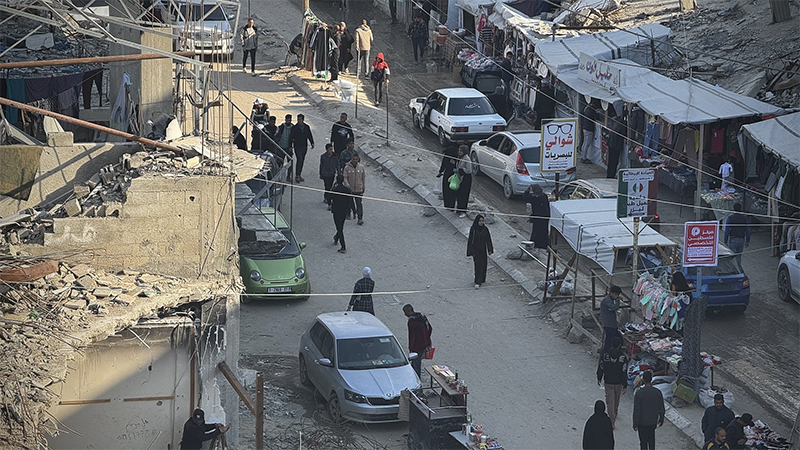
People shop at a roadside market during Ramadan in Khan Yunis, Gaza, Palestine, on March 4, 2025. /VCG
The weeks-long ceasefire in Gaza appears increasingly tenuous as Israel suggests extending the first phase under a U.S.-backed proposal, while Hamas pushes for second-phase talks to end the conflict permanently, exposing yet another chasm that blocks the path to peace.
For a long time, Israeli Prime Minister Benjamin Netanyahu has been caught between political calculation and mounting public pressure. On one hand, his government is under relentless scrutiny from far-right coalition partners, whose uncompromising stance on the war and insistence on a "total victory" have left little room for compromise.
Finance Minister Bezalel Smotrich, for instance, has warned that any deviation from the current stance – which insists that Hamas must release more hostages before any further concessions – could jeopardize the government's stability. His uncompromising position is shared by other far-right politicians, like Itamar Ben-Gvir, who resigned from the government over the Gaza ceasefire deal. Having decried any proposal that might leave Hamas with residual power in Gaza, both Smotrich and Ben-Gvir argued that only total dismantlement of Hamas's military and political apparatus will suffice.
This internal divide has placed Netanyahu in a difficult position, as he struggles to balance the demands of his far-right allies with the urgent humanitarian and political calls for a negotiated peace.
In the meantime, public support for the war has slipped to a new low. A February poll by Israeli media outlet Channel 12 found that 70 percent of Israelis back the second phase of the ceasefire, and even among those who voted for the right-wing coalition, it found that 54 percent are in favor and 36 percent are against.
Anti-war demonstrations have surged across the country, underscoring the emotional toll of the conflict. Families of hostages and activists have persistently taken to the streets, demanding that Netanyahu's government prioritize the safe return of their loved ones over prolonged military operations.
On the other side of the negotiating table, Hamas has remained resolute. "Extending the first phase of the deal in the format that Israel wants is unacceptable to the organization," Hamas spokesperson Hazem Qassem told Al-Araby TV, emphasizing that any move to prolong the current truce without a swift transition to a comprehensive deal would betray the original agreement.
Qassem's remarks highlight a critical impasse: while Israel pushes for a temporary extension to buy time for additional hostage releases, Hamas insists that negotiations must immediately shift toward the second phase – a more encompassing deal that would secure Israel's complete withdrawal from Gaza and free all remaining captives.
What seems to exacerbate this diplomatic stalemate is the U.S.' staunch pro-Israel stance – a position that many international actors say is counterproductive to achieving lasting peace and advancing ceasefire talks.
The U.S.-backed proposal, which suggests an extension of the first phase of the ceasefire, appears to have given room for Israel to ignore the original truce agreement, while U.S. President Donald Trump's proposed plan to take over Gaza has not only reinforced Israel's determination to maintain its uncompromising security demands but also deepened regional tensions, leaving little space for compromise.
Nonetheless, Arab states' wholesale rejection of Washington's stance has served as a counterbalance to a mounting drift from the Gaza ceasefire deal. At an emergency summit held on Tuesday, Arab leaders adopted a post-war reconstruction plan for Gaza that would cost $53 billion and avert displacing Palestinians from the enclave, in contrast to Trump's relocation plan.
The proposal, which also envisions an administrative committee of Palestinian technocrats entrusted with the governance of Gaza, was welcomed by Hamas but rejected by the U.S. and Israel, who argue the plan would still leave Hamas in power.
Throughout the war, Netanyahu has consistently maintained that a ceasefire can only be considered if Hamas is completely dismantled, but observers say Netanyahu's inflexible stance is not solely about military strategy; it is also driven by a pressing need to maintain political power.
Facing corruption charges and a fractious coalition, Netanyahu relies on portraying himself as a steadfast defender of national security – a posture that reassures his far-right allies and appeals to a significant segment of the electorate. As critics argue, his refusal to engage in negotiations that might leave Hamas intact is as much about avoiding any perception of weakness as it is about fulfilling his declared war aims. In this context, the eradication of Hamas is seen as a prerequisite not only for ending hostilities but also for safeguarding his political future.





